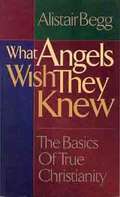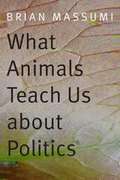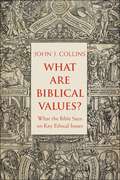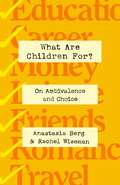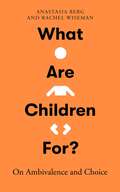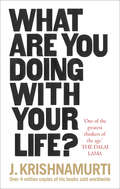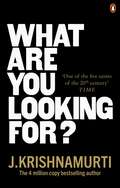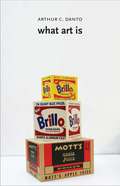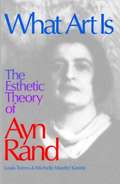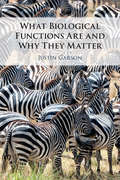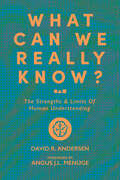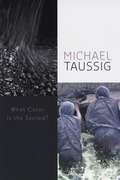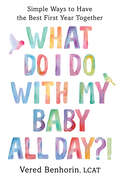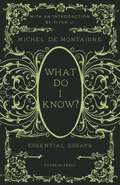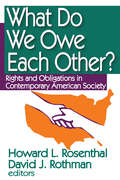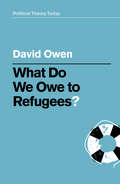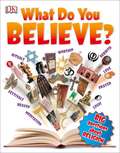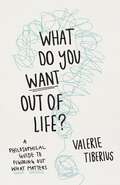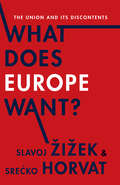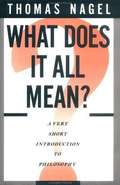- Table View
- List View
What Angels Wish They Knew: The Basics of True Christianity
by Alistair BeggAlistair Begg probes the search for the meaning of life, what the Bible says about it, how we can serve our "original purpose" and obtain fulfilment.
What Animals Teach Us about Politics
by Brian MassumiIn What Animals Teach Us about Politics, Brian Massumi takes up the question of "the animal." By treating the human as animal, he develops a concept of an animal politics. His is not a human politics of the animal, but an integrally animal politics, freed from connotations of the "primitive" state of nature and the accompanying presuppositions about instinct permeating modern thought. Massumi integrates notions marginalized by the dominant currents in evolutionary biology, animal behavior, and philosophy--notions such as play, sympathy, and creativity--into the concept of nature. As he does so, his inquiry necessarily expands, encompassing not only animal behavior but also animal thought and its distance from, or proximity to, those capacities over which human animals claim a monopoly: language and reflexive consciousness. For Massumi, humans and animals exist on a continuum. Understanding that continuum, while accounting for difference, requires a new logic of "mutual inclusion." Massumi finds the conceptual resources for this logic in the work of thinkers including Gregory Bateson, Henri Bergson, Gilbert Simondon, and Raymond Ruyer. This concise book intervenes in Deleuze studies, posthumanism, and animal studies, as well as areas of study as wide-ranging as affect theory, aesthetics, embodied cognition, political theory, process philosophy, the theory of play, and the thought of Alfred North Whitehead.
What Are Biblical Values?: What the Bible Says on Key Ethical Issues
by John CollinsAn illuminating exploration of the Bible and many of our most contentious contemporary issues Many people today claim that their positions on various issues are grounded in biblical values, and they use scriptural passages to support their claims. But the Bible was written over the course of several hundred years and contains contradictory positions on many issues. The Bible seldom provides simple answers; it more often shows the complexity of moral problems. Can we really speak of “biblical values”? In this eye-opening book, one of the world’s leading biblical scholars argues that when we read the Bible with care, we are often surprised by what we find. Examining what the Bible actually says on a number of key themes, John Collins covers a vast array of topics, including the right to life, gender, the role of women, the environment, slavery and liberation, violence and zeal, and social justice. With clarity and authority, he invites us to dramatically reimagine the basis for biblical ethics in the world today.
What Are Children For?: On Ambivalence and Choice
by Rachel Wiseman Anastasia BergA modern argument, grounded in philosophy and cultural criticism, about childbearing ambivalence and how to overcome it Becoming a parent, once the expected outcome of adulthood, is increasingly viewed as a potential threat to the most basic goals and aspirations of modern life. We seek self-fulfillment; we want to liberate women to find meaning and self-worth outside the home; and we wish to protect the planet from the ravages of climate change. Weighing the pros and cons of having children, Millennials and Zoomers are finding it increasingly difficult to judge in its favor. With lucid argument and passionate prose, Anastasia Berg and Rachel Wiseman offer the guidance necessary to move beyond uncertainty. The decision whether or not to have children, they argue, is not just a women’s issue but a basic human one. And at a time when climate change worries threaten the very legitimacy of human reproduction, Berg and Wiseman conclude that neither our personal nor collective failures ought to prevent us from embracing the fundamental goodness of human life—not only in the present but, in choosing to have children, in the future.
What Are Children For?: On Ambivalence and Choice
by Rachel Wiseman Anastasia BergHaving children is one of the biggest decisions you&’ll make in your life. Increasingly, we aren&’t making it at all. 'A book for lovers of sound reasoning.' THE NEW YORKER Across the developed world, fewer and fewer people are becoming parents. We seek self-fulfilment; we want women to find meaning and self-worth outside the household; we wish to protect the planet from the ravages of climate change; we do what we can to protect others from senseless suffering. On the face of it, none of these goals are served by having children. Amid such pressures, how on earth can we make the choice to do so? Anastasia Berg and Rachel Wiseman offer a way out of this inertia and indecision by reminding us that in making the individual decision whether to have children, we confront a profound philosophical question: for all its pains and failures, is human life worth living? What Are Children For? is a stirring call to overcome fear and dread and embrace the value of human existence and a human future.
What Are You Doing With Your Life?
by J. Krishnamurti'One of the greatest thinkers of the age' The Dalai Lama'One of the five saints of the 20th century' - TIME magazine 'Krishnamurti influenced me profoundly' - Deepak Chopra Who are you?What are you?What do you want from life? One of the world's great philosophical teachers, Krishnamurti, offers his inspiring wisdom on many of life's hurdles from relationships and love, to anxiety and loneliness. He answers such questions as 'What is the significance of life?' and 'How do I live life to the full?' to reveal the best way of being true to yourself. Read by millions from all walks of life, Krishnamurti shows us there is no path, no higher authority, no guru to follow, and that ultimately it is our own responsibility as to how we live our lives.
What Are You Looking For?
by J. KrishnamurtiFOUR MILLION COPY BESTSELLING AUTHOR 'One of the greatest thinkers of the age' The Dalai Lama What is love?Who am I without my relationships? What is the relationship between myself and society?One of the world's greatest philosophical teachers, Krishnamurti, offers his inspiring wisdom on a core feature of life: our relationships. From parents to partners and colleagues to friends, Krishnamurti answers our deepest defining questions and reveals a path to truly loving yourself, others and the world around you.
What Art Is
by Arthur C. DantoWhat is it to be a work of art? Renowned author and critic Arthur C. Danto addresses this fundamental, complex question. Part philosophical monograph and part memoiristic meditation, What Art Is challenges the popular interpretation that art is an indefinable concept, instead bringing to light the properties that constitute universal meaning. Danto argues that despite varied approaches, a work of art is always defined by two essential criteria: meaning and embodiment, as well as one additional criterion contributed by the viewer: interpretation. Danto crafts his argument in an accessible manner that engages with both philosophy and art across genres and eras, beginning with Plato's definition of art in The Republic, and continuing through the progress of art as a series of discoveries, including such innovations as perspective, chiaroscuro, and physiognomy. Danto concludes with a fascinating discussion of Andy Warhol's famous shipping cartons, which are visually indistinguishable from the everyday objects they represent.Throughout, Danto considers the contributions of philosophers including Descartes, Kant, and Hegel, and artists from Michelangelo and Poussin to Duchamp and Warhol, in this far-reaching examination of the interconnectivity and universality of aesthetic production.
What Art Is: The Esthetic Theory of Ayn Rand
by Michelle Kamhi Louis TorresWhat is art? The arts establishment has a simple answer: anything is art if a reputed artist or expert says it is. Though many people are skeptical about the alleged new art forms that have proliferated since the early twentieth century, today's critics claim that all such work, however incomprehensible, is art.A groundbreaking alternative to this view is provided by philosopher-novelist Ayn Rand (1901-1982). Best known as the author of The Fountainhead and Atlas Shrugged, Rand also created an original and illuminating theory of art, which confirms the widespread view that much of today's purported art is not really art at all. In What Art Is, Torres and Kamhi present a lucid introduction to Rand's esthetic theory, contrasting her ideas with those of other thinkers. They conclude that, in its basic principles, her account is compelling, and is corroborated by evidence from anthropology, neurology, cognitive science, and psychology.The authors apply Rand's theory to a debunking of the work of prominent modernists and postmodernists-from Mondrian, Jackson Pollock, and Samuel Beckett to John Cage, Merce Cunningham, and other highly regarded postmodernist figures. Finally, they explore the implications of Rand's ideas for the issues of government and corporate support of the arts, art law, and art education."This is one of the most interesting, provocative, and well-written books on aesthetics that I know. While fully accessible to the general reader, What Art Is should be of great interest to specialists as well. Ayn Rand's largely unknown writings on art-especially as interpreted, released from dogma, and smoothed out by Torres and Kamhi-are remarkably refined. Moreover, her ideas are positively therapeutic after a century of artistic floundering and aesthetic quibbling. Anyone interested in aesthetics, in the purpose of art, or in the troubling issues posed by modernism and post modernism should read this book."-Randall R. Dipert Author of Artifacts, Art Works, and Agency"Torres and Kamhi effectively situate Rand's long-neglected esthetic theory in the wider history of ideas. They not only illuminate her significant contribution to an understanding of the nature of art; they also apply her ideas to a trenchant critique of the twentieth century's 'advanced art.' Their exposure of the invalidity of abstract art is itself worth the price of admission."-Chris Matthew Sciabarra Author of Ayn Rand: The Russian Radical"Rand's aesthetic theory merits careful study and thoughtful criticism, which Torres and Kamhi provide. Their scholarship is sound, their presentation is clear, and their judgment is refreshingly free from the biases that Rand's supporters and detractors alike tend to bring to considerations of her work."-Stephen Cox University of California, San Diego
What Biological Functions Are and Why They Matter
by Justin GarsonThe biological functions debate is a perennial topic in the philosophy of science. In the first full-length account of the nature and importance of biological functions for many years, Justin Garson presents an innovative new theory, the 'generalized selected effects theory of function', which seamlessly integrates evolutionary and developmental perspectives on biological functions. He develops the implications of the theory for contemporary debates in the philosophy of mind, the philosophy of medicine and psychiatry, the philosophy of biology, and biology itself, addressing issues ranging from the nature of mental representation to our understanding of the function of the human genome. Clear, jargon-free, and engagingly written, with accessible examples and explanatory diagrams to illustrate the discussion, his book will be highly valuable for readers across philosophical and scientific disciplines.
What Can We Hope For?: Essays on Politics
by Richard RortyPrescient essays about the state of our politics from the philosopher who predicted that a populist demagogue would become president of the United StatesRichard Rorty, one of the most influential intellectuals of recent decades, is perhaps best known today as the philosopher who, almost two decades before the 2016 U.S. presidential election, warned of the rise of a Trumpian strongman in America. What Can We Hope For? gathers nineteen of Rorty’s essays on American and global politics, including four previously unpublished and many lesser-known and hard-to-find pieces.In these provocative and compelling essays, Rorty confronts the critical challenges democracies face at home and abroad, including populism, growing economic inequality, and overpopulation and environmental devastation. In response, he offers optimistic and realistic ideas about how to address these crises. He outlines strategies for fostering social hope and building an inclusive global community of trust, and urges us to put our faith in trade unions, universities, bottom-up social campaigns, and bold political visions that thwart ideological pieties.Driven by Rorty’s sense of emergency about our collective future, What Can We Hope For? is filled with striking diagnoses of today’s political crises and creative proposals for solving them.
What Can We Really Know?: The Strengths and Limits of Human Understanding
by David AndersenToday, it' s not uncommon to get the impression that our claims to know are either doomed before they begin or that they have a status that approaches certainty. The pendulum seems to swing from one end to the other, with our educational institutions too often perpetuating both depending on the person being asked. Yet the question of how and if our claims to know are really justified remains central. * Is knowledge a purely social construct without any objective basis, as many claim? * Or, if we do have some basis to believe some of our claims, are we justified in holding those claims with an attitude of certainty, as others in today' s environment seem to imply? * And what role do our quick judgments play in those claims? From the tenor of our public debates, one could easily be left with the suspicion that either we can' t know anything or that whatever the present state of knowledge is shouldn' t be questioned. What Can We Really Know? The Strengths and Limits of Human Understanding aims to bring some balance to the topic, and argues that while we do have reason to believe that a great many of our claims are justified, it' s also true that much of what passes for knowledge is a social product and therefore vulnerable to future revision. Exploring how knowledge can be understood, how far science can take us and what its limitations might be, and the status of some of the most recent arguments for God' s existence, it will be suggested that a healthy dose of humility should be reincorporated in our public and private debates.
What Color Is the Sacred?
by Michael TaussigA meditation on the mysteries of color and the fascination they provoke, this book is the next step on Taussig's remarkable intellectual path. This book uses color to explore further dimensions of what Taussig calls the bodily unconscious in an age of global warming.
What Color Is the Sacred?
by Michael TaussigOver the past thirty years, visionary anthropologist Michael Taussig has crafted a highly distinctive body of work. Playful, enthralling, and whip-smart, his writing makes ingenious connections between ideas, thinkers, and things. An extended meditation on the mysteries of color and the fascination they provoke, What Color Is the Sacred? is the next step on Taussig’s remarkable intellectual path. Following his interest in magic and surrealism, his earlier work on mimesis, and his recent discussion of heat, gold, and cocaine in My Cocaine Museum,this book uses color to explore further dimensions of what Taussig calls “the bodily unconscious” in an age of global warming. Drawing on classic ethnography as well as the work of Benjamin, Burroughs, and Proust, he takes up the notion that color invites the viewer into images and into the world. Yet, as Taussig makes clear, color has a history—a manifestly colonial history rooted in the West’s discomfort with color, especially bright color, and its associations with the so-called primitive. He begins by noting Goethe’s belief that Europeans are physically averse to vivid color while the uncivilized revel in it, which prompts Taussig to reconsider colonialism as a tension between chromophobes and chromophiliacs. And he ends with the strange story of coal, which, he argues, displaced colonial color by giving birth to synthetic colors, organic chemistry, and IG Farben, the giant chemical corporation behind the Third Reich. Nietzsche once wrote, “So far, all that has given colour to existence still lacks a history.” With What Color Is the Sacred? Taussig has taken up that challenge with all the radiant intelligence and inspiration we’ve come to expect from him.
What Do I Do with My Baby All Day?!: Simple Ways to Have the Best First Year Together
by Vered BenhorinMusic, psychology, and motherhood intertwine in simple activities that instill calm, inspire playfulness, and encourage communication between baby and parent. Let’s be real: Caring for a baby can be exhaustingly tedious. Enter Vered Benhorin, musician, therapist, and mother of three. In What Do I Do with My Baby All Day?, Benhorin builds on the foundations of attachment theory and blends practical tools with research to teach parents how to develop a more gratifying relationship with their baby. With her guidance, parents will step into the present with their baby and truly enjoy one another using her easy, guided activities. From a baby buddha massage to babble boost (singing nonsense words), small “bubble moments” throughout the day provide a shared experience between parent and child that benefits both. These moments also have practical applications, like soothing the baby when they’re fussy, making bedtime more effective, strengthening routines, and increasing communication and language. This book is a must-have for new parents everywhere.
What Do I Know?: Essential Essays
by Michel de MontaigneA fresh new translation of Michel de Montaigne&’s most profound, searching essays, with an introduction from Yiyun Li, author of The Book of GooseThis gift-worthy collection of 16 essays by &“the father of the essay&” is a short, accessible introduction to his work, offering a fascinating glimpse inside a great Renaissance mind&“I myself am the subject of my book.&” So wrote Montaigne in the introductory note to his Essays, the book that marked the birth of the modern essay form.In works of probing intelligence and idiosyncratic observation, Montaigne moved from intimate personal observation to roving theories of the conduct of kings and cannibals, the effects of sorrow and fear, and the fallibility of human memory and judgement.This new selection of Montaigne&’s 16 most ingenious essays appears in a lucid new translation by the prize-winning David Coward. What Do I Know? gives the modern reader profound insight into a great Renaissance mind.What Do I Know? is divided into 3 sections and includes:MONTAIGNE ON MONTAIGNEOn Sorrow, On how our Actions are to be judged by the Intention, On Idling, On Liars, That we should not be considered happy until we are deadON THE PURSUIT OF REASONOn Fear, To tell true from false, it is folly to rely on our own capacities, How we can cry and laugh at the same thing, On Solitude, On the Uncertainty of our Judgement, On DrunkennessON GOVERNANCE AND GOVERNORSOn Cannibals, On the Inequality that exists between us, On Sleep, On our lease of life, On Carriages
What Do We Owe Each Other?: Rights and Obligations in Contemporary American Society
by Howard L Rosenthal David J RothmanFirst Published in 2017. Routledge is an imprint of Taylor & Francis, an Informa company.
What Do We Owe Other Animals?: A Debate (Little Debates about Big Questions)
by Bob Fischer Anja JauernigPhilosophers Bob Fischer and Anja Jauernig agree that human society often treats animals in indefensible ways and that all animals morally matter; they disagree on whether humans and animals morally matter equally. In What Do We Owe Other Animals?: A Debate, Fischer and Jauernig square off over this central question in animal ethics. Jauernig defends the view that all living beings morally matter equally and are owed compassion, on account of which we are also obligated to adopt a vegan diet. Fischer denies that we have an obligation to become vegans, and argues for the position that humans morally matter more than all other living creatures. The two authors each offer a clear, well-developed opening statement, a direct response to the other’s statement, and then a response to the other’s response. Along the way, they explore central questions, like: What kind of beings matter morally? What kind of obligations do we have towards other animals? How demanding can we reasonably expect these obligations to be? Do our individual consumer choices, such as the choice to purchase factory-farmed animal products, make a difference to the wellbeing of animals? The debate is helpfully framed by introductions and conclusions to each of the major parts and by smaller introductions to each of the sub-sections. A Foreword by Dustin Crummett sets the context for the debate within a larger discussion of sentience, moral standing, reason-guided compassion, and the larger field of animal ethics. Key Features • Showcases the presentation and defense of two points of view on the moral worth of non-human animals• Provides frequent summaries of previously covered material• Includes a topically-organized list of Further Readings and a Glossary of all specialized vocabulary
What Do We Owe to Refugees? (Political Theory Today)
by David OwenWho are refugees? Who, if anyone, is responsible for protecting them? What forms should this protection take? In a world of people fleeing from civil wars, state failure, and environmental disasters, these are ethically and politically pressing questions. In this book, David Owen reveals how the contemporary politics of refuge is structured by two rival historical pictures of refugees. In reconstructing this history, he advocates an understanding of refugeehood that moves us beyond our current impasse by distinguishing between what is owed to refugees in general and what is owed to different types of refugee. He provides an account of refugee protection and the forms of international cooperation required to implement it that is responsive to the claims of both refugees and states. At a time when refugee protection is once again prominent on the international agenda, this book offers a guide to understanding the challenges this topic raises and shows why addressing it matters for all of us.
What Do You Believe? (Big Questions)
by Dorling Kindersley Publishing StaffReligion, morality, science, and the afterlife are complex and often misunderstood subjects. What Do You Believe? is a dynamic and clear text that brings together a variety of ideas of on religion. They are clearly presented for children to understand in a clear, unbiased text, and key concepts are broken down into manageable chunks of information with keywords that are simply explained. What Do You Believe? looks at basic teachings, practices of world faiths, philosophy, and more, and delves into the meaning and purpose of life. This book promotes understanding, tolerance, and respect for people whatever they believe.
What Do You Want Out of Life?: A Philosophical Guide to Figuring Out What Matters
by Valerie TiberiusA short guide to living well by understanding better what you really value—and what to do when your goals conflictWhat do you want out of life? To make a lot of money—or work for justice? To run marathons—or sing in a choir? To have children—or travel the world? The things we care about in life—family, friendship, leisure activities, work, our moral ideals—often conflict, preventing us from doing what matters most to us. Even worse, we don’t always know what we really want, or how to define success. Blending personal stories, philosophy, and psychology, this insightful and entertaining book offers invaluable advice about living well by understanding your values and resolving the conflicts that frustrate their fulfillment.Valerie Tiberius introduces you to a way of thinking about your goals that enables you to reflect on them effectively throughout your life. She illustrates her approach with vivid examples, many of which are drawn from her own life, ranging from the silly to the serious, from shopping to navigating prejudice. Throughout, the book emphasizes the importance of interconnectedness, reminding us of the profound influence other people have on our lives, our goals, and how we should pursue them. At the same time, the book offers strategies for coping with obstacles to realizing your goals, including gender bias and other kinds of discrimination.Whether you are changing jobs, rethinking your priorities, or reconsidering your whole life path, What Do You Want Out of Life? is an essential guide to helping you understand what really matters to you and how you can thoughtfully pursue it.
What Does Europe Want?
by Slavoj iek Srecko HorvatTwo critical heavyweights call on Europe to radically resist global injustice and become a more conscientious player in world politics.
What Does Europe Want?
by Slavoj iek Srecko HorvatTwo critical heavyweights call on Europe to radically resist global injustice and become a more conscientious player in world politics.
What Does Europe Want?: The Union and Its Discontents (Insurrections: Critical Studies in Religion, Politics, and Culture)
by Slavoj Žižek Srećko HorvatSlavoj i ek and Srecko Horvat combine their critical clout to emphasize the dangers of ignoring Europe's growing wealth gap and the parallel rise in right-wing nationalism, which is directly tied to the fallout from the ongoing financial crisis and its prescription of imposed austerity. To general observers, the European Union's economic woes appear to be its greatest problem, but the real peril is an ongoing ideological–political crisis that threatens an era of instability and reactionary brutality. The fall of communism in 1989 seemed to end the leftist program of universal emancipation. However, nearly a quarter of a century later, the European Union has failed to produce any coherent vision that can mobilize people to action. Until recently, the only ideology receptive to European workers has been the nationalist call to "defend" against immigrant integration. Today, Europe is focused on regulating the development of capitalism and promoting a reactionary conception of its cultural heritage. Yet staying these courses, i ek and Horvat show, only strips Europe of its power and stifles its political ingenuity. The best hope is for Europe to revive and defend its legacy of universal egalitarianism, which benefits all parties by preserving the promise of equal representation.
What Does It All Mean? A Very Short Introduction to Philosophy
by Thomas NagelOne philosopher's very short introductory account and critique of various philosophical problems.
